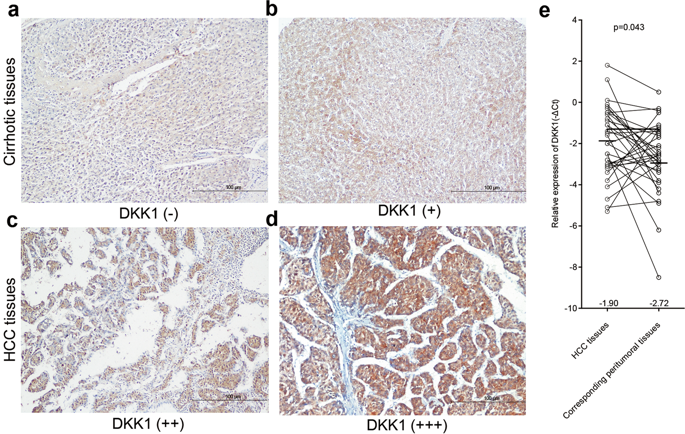当前位置:
X-MOL 学术
›
Signal Transduct. Target Ther.
›
论文详情
Our official English website, www.x-mol.net, welcomes your
feedback! (Note: you will need to create a separate account there.)
Dickkopf-1 contributes to hepatocellular carcinoma tumorigenesis by activating the Wnt/β-catenin signaling pathway.
Signal Transduction and Targeted Therapy ( IF 40.8 ) Pub Date : 2019-12-06 , DOI: 10.1038/s41392-019-0082-5 Rui Zhang 1, 2 , Hao-Ming Lin 1 , Ruth Broering 2 , Xiang-de Shi 1 , Xian-Huan Yu 1 , Lei-Bo Xu 1 , Wen-Rui Wu 1 , Chao Liu 1
Signal Transduction and Targeted Therapy ( IF 40.8 ) Pub Date : 2019-12-06 , DOI: 10.1038/s41392-019-0082-5 Rui Zhang 1, 2 , Hao-Ming Lin 1 , Ruth Broering 2 , Xiang-de Shi 1 , Xian-Huan Yu 1 , Lei-Bo Xu 1 , Wen-Rui Wu 1 , Chao Liu 1
Affiliation

|
Dysregulation of dickkopf-related protein 1 (DKK1) expression has been reported in a variety of human cancers. We previously reported that DKK1 was upregulated in hepatocellular carcinoma (HCC). However, the role of DKK1 in HCC remains unclear. This study aimed to investigate the clinical significance and biological functions of DKK1 in HCC. The expression of DKK1 was examined in cirrhotic and HCC tissues by immunohistochemistry and quantitative real-time polymerase chain reaction (qRT-PCR). DKK1 was silenced or overexpressed in HCC cell lines, and in vitro and in vivo studies were performed. Immunohistochemistry revealed that DKK1 was weakly expressed in cirrhotic tissues (8/22, 36.4%) but upregulated in HCC tissues (48/53, 90.6%, cohort 1). Significant upregulation of DKK1 was observed in 57.6% (19/33, cohort 2) of HCC tissues by qRT-PCR, and the expression of DKK1 was associated with tumor size (P = 0.024) and tumor number (P = 0.019). Genetic depletion of DKK1 impaired the proliferation, colony-forming ability, invasion, and tumor formation of HCC cells (HepG2 and HUH-7). Conversely, forced expression of DKK1 increased the proliferation, colony-forming ability, and invasion of HepG2 and HUH-7 cells in vitro and enhanced tumor formation in vivo. Subsequent investigation revealed that the DKK1-mediated proliferation and tumorigenicity of HepG2 and HUH-7 cells is dependent on the Wnt/β-catenin signaling pathway. These findings indicate that DKK1 plays an oncogenic role in HCC by activating the Wnt/β-catenin signaling pathway.
中文翻译:

Dickkopf-1 通过激活 Wnt/β-catenin 信号通路促进肝细胞癌肿瘤发生。
据报道,在多种人类癌症中,dickkopf 相关蛋白 1 (DKK1) 表达失调。我们之前报道过 DKK1 在肝细胞癌 (HCC) 中表达上调。然而,DKK1 在 HCC 中的作用仍不清楚。本研究旨在探讨DKK1在HCC中的临床意义和生物学功能。通过免疫组织化学和定量实时聚合酶链反应 (qRT-PCR) 检查肝硬化和 HCC 组织中 DKK1 的表达。DKK1 在 HCC 细胞系中被沉默或过表达,并进行了体外和体内研究。免疫组织化学显示,DKK1 在肝硬化组织中表达较弱(8/22,36.4%),但在 HCC 组织中表达上调(48/53,90.6%,队列 1)。通过 qRT-PCR,在 57.6%(19/33,队列 2)的 HCC 组织中观察到 DKK1 显着上调,并且 DKK1 的表达与肿瘤大小(P = 0.024)和肿瘤数量(P = 0.019)相关。DKK1 基因缺失会损害 HCC 细胞(HepG2 和 HUH-7)的增殖、集落形成能力、侵袭和肿瘤形成。相反,DKK1的强制表达增加了HepG2和HUH-7细胞的体外增殖、集落形成能力和侵袭,并增强了体内肿瘤形成。随后的研究表明,DKK1介导的HepG2和HUH-7细胞的增殖和致瘤性依赖于Wnt/β-catenin信号通路。这些发现表明 DKK1 通过激活 Wnt/β-catenin 信号通路在 HCC 中发挥致癌作用。
更新日期:2019-12-06
中文翻译:

Dickkopf-1 通过激活 Wnt/β-catenin 信号通路促进肝细胞癌肿瘤发生。
据报道,在多种人类癌症中,dickkopf 相关蛋白 1 (DKK1) 表达失调。我们之前报道过 DKK1 在肝细胞癌 (HCC) 中表达上调。然而,DKK1 在 HCC 中的作用仍不清楚。本研究旨在探讨DKK1在HCC中的临床意义和生物学功能。通过免疫组织化学和定量实时聚合酶链反应 (qRT-PCR) 检查肝硬化和 HCC 组织中 DKK1 的表达。DKK1 在 HCC 细胞系中被沉默或过表达,并进行了体外和体内研究。免疫组织化学显示,DKK1 在肝硬化组织中表达较弱(8/22,36.4%),但在 HCC 组织中表达上调(48/53,90.6%,队列 1)。通过 qRT-PCR,在 57.6%(19/33,队列 2)的 HCC 组织中观察到 DKK1 显着上调,并且 DKK1 的表达与肿瘤大小(P = 0.024)和肿瘤数量(P = 0.019)相关。DKK1 基因缺失会损害 HCC 细胞(HepG2 和 HUH-7)的增殖、集落形成能力、侵袭和肿瘤形成。相反,DKK1的强制表达增加了HepG2和HUH-7细胞的体外增殖、集落形成能力和侵袭,并增强了体内肿瘤形成。随后的研究表明,DKK1介导的HepG2和HUH-7细胞的增殖和致瘤性依赖于Wnt/β-catenin信号通路。这些发现表明 DKK1 通过激活 Wnt/β-catenin 信号通路在 HCC 中发挥致癌作用。











































 京公网安备 11010802027423号
京公网安备 11010802027423号